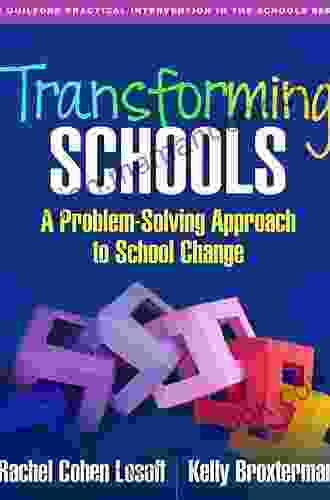Problem-Solving Approach to School Change: The Guilford Practical Intervention

School change is a complex and challenging endeavor. Many factors contribute to school success, and there is no one-size-fits-all solution for improving student outcomes. However, research has shown that a problem-solving approach to school change can be effective in addressing the unique needs of each school.
One of the most well-known and successful problem-solving approaches to school change is the Guilford Practical Intervention (GPI). GPI is a comprehensive framework that helps schools identify and address the root causes of academic problems. It is based on the belief that schools are complex systems that must be understood in order to be changed effectively.
GPI is based on six key principles:
5 out of 5
| Language | : | English |
| File size | : | 5076 KB |
| Screen Reader | : | Supported |
| Print length | : | 245 pages |
- Focus on student outcomes. The ultimate goal of GPI is to improve student outcomes. This means that all decisions about school change should be made with the goal of improving student learning.
- Use data to drive decision-making. Data is essential for understanding the root causes of academic problems. GPI uses a variety of data sources to track student progress and identify areas where improvement is needed.
- Involve all stakeholders. GPI is a collaborative process that involves all stakeholders, including teachers, administrators, parents, and students. This ensures that everyone has a voice in the decision-making process and that the changes that are made are supported by the entire school community.
- Use a problem-solving approach. GPI uses a problem-solving approach to school change. This means that schools are encouraged to identify problems, develop solutions, and implement those solutions in a systematic way.
- Be flexible and adaptable. GPI is a flexible framework that can be adapted to meet the unique needs of each school. There is no one-size-fits-all solution, and schools should be able to tailor the GPI process to their own specific circumstances.
- Be sustainable. GPI is designed to be sustainable over time. The changes that are made should be embedded in the school's culture and practices so that they can continue to improve student outcomes in the long term.
GPI is a five-step process:
- Assessment: The first step is to assess the school's current state and identify the root causes of academic problems. This involves collecting data from a variety of sources, including student assessments, teacher surveys, and parent interviews.
- Planning: Once the root causes of academic problems have been identified, the school develops a plan to address those causes. This plan should be based on evidence-based practices and should be tailored to the unique needs of the school.
- Implementation: The next step is to implement the plan. This involves putting the changes into practice and monitoring progress to ensure that the plan is working as intended.
- Evaluation: The final step is to evaluate the effectiveness of the plan. This involves collecting data to track student progress and identifying areas where further improvement is needed.
- Sustainability: The goal of GPI is to create sustainable changes that will continue to improve student outcomes over time. This involves embedding the changes in the school's culture and practices and providing ongoing support to the school community.
Research has shown that GPI is effective in improving student outcomes. A study by the University of North Carolina found that schools that implemented GPI saw significant gains in student achievement. The study found that students in GPI schools outperformed students in control schools on a variety of measures, including reading, math, and science.
Another study by the National Center for Education Evaluation and Regional Assistance found that GPI was effective in reducing dropout rates. The study found that schools that implemented GPI had lower dropout rates than control schools.
The problem-solving approach to school change is a powerful tool that can help schools improve student outcomes. The Guilford Practical Intervention is a well-researched and effective problem-solving approach that can be tailored to meet the unique needs of each school. Schools that are looking to improve student outcomes should consider implementing GPI.
5 out of 5
| Language | : | English |
| File size | : | 5076 KB |
| Screen Reader | : | Supported |
| Print length | : | 245 pages |
Do you want to contribute by writing guest posts on this blog?
Please contact us and send us a resume of previous articles that you have written.
 Top Book
Top Book Novel
Novel Fiction
Fiction Nonfiction
Nonfiction Literature
Literature Paperback
Paperback Hardcover
Hardcover E-book
E-book Audiobook
Audiobook Bestseller
Bestseller Classic
Classic Mystery
Mystery Thriller
Thriller Romance
Romance Fantasy
Fantasy Science Fiction
Science Fiction Biography
Biography Memoir
Memoir Autobiography
Autobiography Poetry
Poetry Drama
Drama Historical Fiction
Historical Fiction Self-help
Self-help Young Adult
Young Adult Childrens Books
Childrens Books Graphic Novel
Graphic Novel Anthology
Anthology Series
Series Encyclopedia
Encyclopedia Reference
Reference Guidebook
Guidebook Textbook
Textbook Workbook
Workbook Journal
Journal Diary
Diary Manuscript
Manuscript Folio
Folio Pulp Fiction
Pulp Fiction Short Stories
Short Stories Fairy Tales
Fairy Tales Fables
Fables Mythology
Mythology Philosophy
Philosophy Religion
Religion Spirituality
Spirituality Essays
Essays Critique
Critique Commentary
Commentary Glossary
Glossary Bibliography
Bibliography Index
Index Table of Contents
Table of Contents Preface
Preface Introduction
Introduction Foreword
Foreword Afterword
Afterword Appendices
Appendices Annotations
Annotations Footnotes
Footnotes Epilogue
Epilogue Prologue
Prologue Crystal Harrell
Crystal Harrell Savannah Rylan
Savannah Rylan Douglas Doman
Douglas Doman Elizabeth Briggs
Elizabeth Briggs Del Sroufe
Del Sroufe Karsten Potts
Karsten Potts Kathy Martin
Kathy Martin Frank Hammond
Frank Hammond Amy Jarecki
Amy Jarecki Zach Abraham
Zach Abraham M V Kasi
M V Kasi Olivia Calabrese
Olivia Calabrese Gene M Kerns
Gene M Kerns Charles Dickens
Charles Dickens Jing Wang
Jing Wang Michelle Spadafore
Michelle Spadafore Kenley Davidson
Kenley Davidson Fred J Young
Fred J Young S Rae
S Rae Cornell Bunting
Cornell Bunting
Light bulbAdvertise smarter! Our strategic ad space ensures maximum exposure. Reserve your spot today!

 Marcel ProustThe Fold: An Explosive Intergalactic Space Opera Adventure That Will Blow...
Marcel ProustThe Fold: An Explosive Intergalactic Space Opera Adventure That Will Blow... Jules VerneFollow ·8.4k
Jules VerneFollow ·8.4k Carlos DrummondFollow ·3k
Carlos DrummondFollow ·3k Gregory WoodsFollow ·14.6k
Gregory WoodsFollow ·14.6k Richard SimmonsFollow ·18.3k
Richard SimmonsFollow ·18.3k Colby CoxFollow ·11.6k
Colby CoxFollow ·11.6k Billy PetersonFollow ·15.9k
Billy PetersonFollow ·15.9k Brenton CoxFollow ·10.9k
Brenton CoxFollow ·10.9k Josh CarterFollow ·12.1k
Josh CarterFollow ·12.1k

 David Peterson
David PetersonUnveiling Eleven of the Wheel of Time: A Journey Through...
In the vast and intricate...

 Curtis Stewart
Curtis StewartEbony Jay Rice: A Rising Star in the Entertainment...
Ebony Jay Rice is a force to be reckoned...

 Matt Reed
Matt ReedNavigating Mental Health with Science: Overcoming...
Mental health is an integral part of...

 Guillermo Blair
Guillermo BlairFormer Magistrate's Poetic Reflections on Love and...
In the hallowed halls...

 Corey Green
Corey GreenOf the Dead: William Burroughs' Post-Beat Masterpiece
William S. Burroughs' Of the...
5 out of 5
| Language | : | English |
| File size | : | 5076 KB |
| Screen Reader | : | Supported |
| Print length | : | 245 pages |












